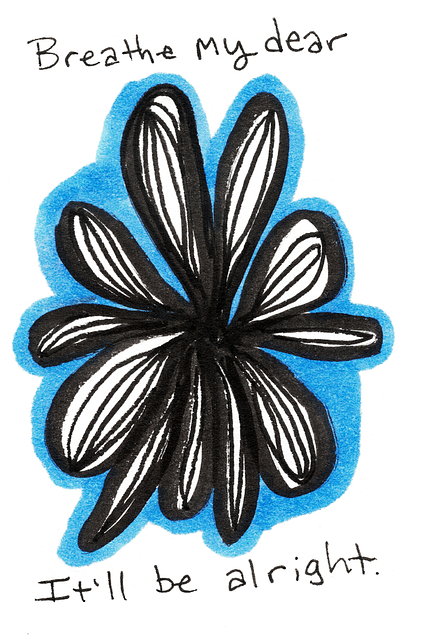Master Time: Stress Relief Therapy for Focused Living

Time management counseling offers personalized strategies to combat stress and boost productivity by…….
In today’s fast-paced and often demanding world, stress has become an ubiquitous companion for many. This pervasive issue has led to a growing interest in effective stress management strategies, with therapy emerging as a cornerstone of mental health care. Stress management therapy, a comprehensive approach to addressing and mitigating stress, has gained significant traction globally. This article aims to guide readers through the intricate world of this therapeutic practice, exploring its various facets, impact, and potential for shaping a healthier future. We will delve into its definition, historical evolution, global reach, economic implications, technological innovations, regulatory frameworks, challenges, case studies, and a glimpse into its promising future.
Stress management therapy is a multifaceted psychological intervention designed to help individuals understand, cope with, and reduce stress-related symptoms. It involves a range of techniques and strategies tailored to an individual’s unique needs and circumstances. At its heart, this therapy recognizes that stress, while a natural response to challenges, can become detrimental when chronic or intense, leading to various mental and physical health issues.
The core components of stress management therapy typically include:
Historically, the roots of stress management therapy can be traced back to the late 20th century when researchers and psychologists began exploring the impact of stress on human health. Early studies focused on identifying specific stressors and their effects on various populations, leading to the development of coping mechanisms and relaxation techniques. Over time, these efforts evolved into structured therapeutic interventions, incorporating elements from cognitive-behavioral therapy, humanistic psychology, and mindfulness practices.
Stress management therapy’s influence is a global phenomenon, with countries across all continents adopting and adapting this approach to suit their unique cultural and social contexts. The World Health Organization (WHO) recognizes the impact of stress on both physical and mental health, highlighting its potential to contribute to various disorders, including cardiovascular diseases, depression, and anxiety. This recognition has fueled the integration of stress management into healthcare systems worldwide.
Here’s a glimpse at some key trends:
The economic implications of stress management therapy are significant, with a growing market driven by increasing demand and evolving healthcare systems. According to a report by the Global Wellness Institute (GWI), the global wellness economy reached an estimated $4.5 trillion in 2018, with mental health and well-being accounting for a substantial share. Within this sector, stress management services, including therapy and related products, are experiencing steady growth.
Market dynamics reveal several key trends:
| Trend | Impact |
|—|—|
| Personalized Therapy: The rise of technology enables therapists to offer more personalized treatment plans, improving client outcomes and satisfaction. | Increased demand for advanced therapeutic tools and training. |
| Telehealth Services: Remote therapy sessions and digital health platforms expand access, particularly in underserved areas. | Wider reach and potential cost savings for both providers and clients. |
| Corporate Wellness: Organizations investing in employee wellness programs to enhance productivity and reduce stress-related absences. | Corporate partnerships with wellness service providers. |
| Self-Help Resources: Growth in the market for mobile apps, online courses, and self-help books focused on stress management. | Increased accessibility but potential challenges in ensuring effectiveness and quality. |
Technology has played a pivotal role in transforming stress management therapy, offering innovative tools and solutions. Here are some notable examples:
Regulatory bodies worldwide play a crucial role in standardizing and overseeing stress management therapy practices to ensure quality and client safety. These regulations guide the training, licensing, and practice of therapists, as well as the marketing and delivery of stress-related services.
Some notable regulatory bodies include:
Despite its growing popularity and potential benefits, stress management therapy faces several challenges that hinder widespread access and effectiveness. Addressing these issues is crucial for ensuring the success and sustainability of this therapeutic approach:
To illustrate the impact of stress management therapy, let’s explore a few compelling case studies:
Case 1: Corporate Wellness Program
A leading technology company implemented a comprehensive wellness program, offering weekly stress management workshops led by certified instructors. The program included mindfulness training, breathing exercises, and time management strategies. Results showed a significant reduction in employee stress levels, improved job satisfaction, and a decrease in work-related burnout. This initiative also led to increased productivity and reduced absenteeism, demonstrating the positive organizational impact of such programs.
Case 2: Digital Therapy for Veterans
A startup developed a digital therapy platform tailored to help veterans struggling with post-traumatic stress disorder (PTSD). The app offered cognitive processing therapy (CPT) and exposure therapy techniques in a user-friendly format. A pilot study revealed that veterans who used the app experienced significant improvements in PTSD symptoms, anxiety, and depression. This case highlights the potential of digital therapeutic solutions to reach a broader population.
Case 3: Community Mindfulness Program
A community center launched a mindfulness program for teenagers, teaching them mindfulness meditation techniques to manage stress and anxiety. The 8-week program showed promising results, with participants reporting improved emotional regulation and reduced symptoms of depression. This initiative not only empowered teens with coping skills but also fostered a supportive community environment.
As we look ahead, stress management therapy is poised to evolve further, driven by technological advancements, changing cultural landscapes, and increasing awareness of mental health. Here are some trends shaping its future:
In conclusion, stress management therapy is a powerful tool for improving mental well-being and overall quality of life. As society navigates the challenges of modern living, this therapeutic approach offers valuable support. By addressing barriers, embracing technology, and fostering cultural sensitivity, stress management therapy can reach more individuals and positively impact their lives.

Time management counseling offers personalized strategies to combat stress and boost productivity by…….

Stress relief therapy leverages holistic techniques like mindfulness, deep breathing, and progressiv…….

Cognitive-behavioral therapy (CBT) targets negative thinking patterns to reduce stress, anxiety, and…….

Corporate stress management programs using structured interventions like cognitive-behavioral therap…….

Mindfulness, an ancient mental practice, is a powerful stress relief therapy. By focusing on the pre…….

Time management counseling tackles stress and anxiety by identifying time wasters like social media,…….

Stress relief therapy combines CBT, mindfulness, relaxation exercises, and problem-solving skills to…….

Emotional regulation through stress relief therapy manages and reduces stress levels by teaching min…….

Ancient practices like yoga and meditation provide effective stress relief therapy through mindfulne…….